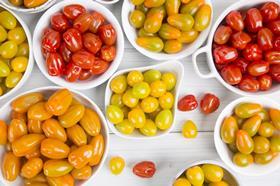
Dutch vegetable breeding and seed production company Rijk Zwaan says it is experiencing increased demand for its products and expertise in South-East Asia, as horticultural production in the region shifts from open field to protected growing methods, and more consumers there seek healthy convenience foods.
Headquartered in De Lier in the province of South Holland, Rijk Zwaan is well known as something of a salad king in Europe and North America – famous for its one-cut Salanova lettuce and delayed-browning Knox among other varieties. Now, these – and its other products – are taking off in Asia too, the company reveals, thanks to new retail and consumption trends taking hold in countries there.
Demand for Rijk Zwaan’s lettuces are already high in Japan, for example, where fresh-cut salads with a long shelf-life are highly sought-after, explains Rijk Zwaan chain & area manager South-East Asia Friso Klok, and where supermarkets dominate the grocery market. In Korea, meanwhile, the group is seeing increased demand for its specialty vegetables and is introducing its Salanova concept to retail in later this year.
Elsewhere in South-East Asia, as the modern retail sector expands, farmers are being required to switch to growing top-spec products with particular traits suited to sale in stores and processing, rather than traditional wet markets. This, says Klok, is causing a shift from open field vegetable production to higher level cultivation methods, thereby generating increased interest in the region for high-quality seeds. Urbanisation, increasing middle-income classes and a scarcity of resources will further push horticulture towards protected cultivation methods in the region, he says.
“This is a great development for us, since we are specialists in developing high-quality seeds with added value for protected horticulture!” says Klok. “Our activities in South and East Asia are increasing fast. We see continuous growth opportunities in a region where more than half of the world's vegetables are consumed. The cultivation level is developing well and our breeding is developing improved varieties in several crops for South and East Asian markets. Examples are Salanova (a one-cut lettuce) and Sweet Palermo (a sweet, pointy paprika) in Japan and Korea, and snack products (lettuce, cucumbers and peppers) in South-East Asia.
“Another type of service we offer in Asia is linking retailers and food processors to production and provide sourcing solutions,” he adds. “We see a growing interest from retailers and processors in vegetable production and that requires a transparent, stable and safe supply chain.”
In response to burgeoning business in Asia, which currently accounts for 5-10 per cent of its global seed sales, Rijk Zwaan is investing in more resources and facilities in the region, Klok reveals.
“We already have demonstration sites in India and Vietnam where we develop and showcase our products, but we are building a new one in Japan and are setting up centres of excellence throughout the region so we can show farmers how best to grow our vegetables. Malaysia, Thailand and the Philippines are other potential areas.”
As well as growing demand for Rijk Zwaan’s salad products, Asian markets – in particular wealthier regions such as Hong Kong and Singapore – are becoming more interested in the seed developer’s melon portfolio too, Klok says.
“We are very excited to add melons, with improved brix and crunchiness, to our assortment in Asia,” he explains. “Now we are seeing our netted type, our honey dew and our quincy type growing in the region.
“Watermelon is one of our newer melon lines, and there is a very good market for watermelon in Asia,” Klok continues. “We are developing added-value, niche watermelons with particular traits, such as a certain flesh colour, seedless or with micro seeds.
“We showcased these new varieties at [the fresh produce trade show] Asia Fruit Logistica in Hong Kong in September, and had samples at our stand for visitors to try.”
Rijk Zwaan also displayed its latest line of snack packs at the show, which include mini-cucumbers, a plum tomato range and loose lettuce leaves.
“Convenience and snacking are what growers and retailers are talking a lot about these days; they are what consumers want and where the added value is,” says Klok. “We are extending our snack vegetable assortment in Asia, with lettuce, cucumber and tomatoes.
“Our snacking cucumber is 8-10cm long and is perfect for lunch boxes and eating on the move. It tastes great and is really crunchy. Our small plum tomatoes come in a range of different colours, and have an intense flavour. And our snacking lettuce is a great alternative to a wrap and can be stuffed with fillings.”
With so much to offer the Asian market, Rijk Zwaan is working hard on expanding its team and activities in Asia and spreading the word about its products across this vast continent and sharing the knowledge needed to best grow its crops.
“We are looking at setting up more demo sites and centres of excellence throughout the region so we can show farmers how to do things,” says Klok. “We see Asia as becoming more and more important to our business, that is why we are investing more resources there.
As a specialist in protected cultivation methods, it is crucial for Rijk Zwaan to have a strong presence there as the market continues to develop.”






No comments yet